Articles by Homero Gil de Zúñiga
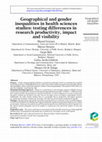
Online Information Review, 2024
Purpose-Gender and geographical imbalance in production and impact levels is a pressing issue in ... more Purpose-Gender and geographical imbalance in production and impact levels is a pressing issue in global knowledge production. Within Health Sciences, while some studies found stark gender and geographical biases and inequalities, others found little empirical evidence of this marginalization. The purpose of the study is to clear the ambiguity concerning the topic. Design/methodology/approach-Based on a comprehensive and systematic analysis of Health Sciences research data downloaded from the Scival (Scopus/Scimago) database from 2017 to 2020 (n 5 7,990), this study first compares gender representation in research productivity, as well as differences in terms of citation per document, citations per document view and view per document scores according to geographical location. Additionally, the study clarifies whether there is a geographic bias in productivity and impact measures (i.e. citation per document, citations per document view and view per document) moderated by gender. Findings-Results indicate that gender inequalities in productivity are systematic at the overall disciplinary, as well as the subfield levels. Findings also suggest statistically significant geographical differences in citation per document, citations per document view, and view per document scores, and interaction effect of gender over the relation between geography and (1) the number of citations per view and (2) the number of views per document. Originality/value-This study contributes to scientometric studies in health sciences by providing insightful findings about the geographical and gender bias in productivity and impact across world regions. Keywords Health science, Research productivity, Research impact, Gender inequalities, Geographical inequalities, Gender bias, Geographical bias Paper type Research paper Following Merton's (1968, 1973) norm of universalism, a growing number of studies have emphasized the need for a diverse science, especially in terms of gender (e.g. Larivi ere et al.,

Political Communication, 2023
Research on Artificial Intelligence (AI) in communication research is gaining broader interest. T... more Research on Artificial Intelligence (AI) in communication research is gaining broader interest. This interdisciplinary interest has yet to be supported by a systematic scholarly definition and by a holistic theoretical framework in communication research. First, combining prior theoretical efforts from diverse disciplines in the social sciences, especially journalism and communication, this study introduces a wideranging working AI scholarly definition in communication research as the tangible real-world capability of non-human machines or artificial entities to perform, task solve, communicate, interact, and act logically as it occurs with biological humans. We also propose its theoretical operationalization based on two dimensions: level of performance and level of autonomy, advancing an elementary conceptual framework drawing on AI's levels of potential actions or performance the AI may accomplish, including 1) performing tasks, 2) taking decisions, and 3) making predictions; as well as AI's level of autonomy, or the agency results contingent on the degrees of human input, interaction, or supervision involved.

MASS COMMUNICATION AND SOCIETY, 2023
News organizations require sustainable business models with reliable revenue streams to perform t... more News organizations require sustainable business models with reliable revenue streams to perform their intended function in liberal democracies. Since the digital transi- tion, however, many citizens have considerably shown high reluctance to pay for digital content, consequently jeopardizing journalists’ watchdog role and substantially eroding media independence. Based on a two-wave panel survey from the United States, this study seeks to investigate the antecedents of readers’ paying beha- vior for news, focusing on the role of social media news use and media skepticism. Findings reveal that users’ frequency of social media news use is associated with future paying behavior, while higher levels of media skepticism significantly inhibit readers’ payment. The analyses also show that while those reporting low media skepticism are initially more inclined to pay for news, high levels of social media news use function to largely overcome this gap. The study argues that the role of social media in delivering news should be rede- fined in light of the new paid content strategies imple- mented by news organizations.

Journalism, 2023
Research has shown positive attitudes toward journalists and their roles foster pro-democratic ou... more Research has shown positive attitudes toward journalists and their roles foster pro-democratic outcomes. With the rise of social media as news sources, algorithms operate as gatekeepers, which may alter linkages between public opinion, journalists, and media trust. However, results from a panel-survey conducted in the U.S. underline citizens’ preference for journalist gatekeeping in fueling trust in traditional and social media news. Conversely, preference for algorithmic news selection does not affect people’s levels of trust. Furthermore, traditional news use moderates this relationship as those who report higher traditional news use and a preference for professional news gatekeeping trust traditional news the most. This study contributes to current discussions on the effects of preference for journalists’ or algorithmic news selection, arguing that evaluations of journalists’ editorial work remain critical to explain media trust.
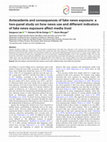
Despite abundant studies on "fake news," the long-term consequences have been less explored. In t... more Despite abundant studies on "fake news," the long-term consequences have been less explored. In this context, this study examines the dynamic relationship between traditional and social news media use, fake news exposure-measured as perceived fake news exposure and exposure to actual fake news stories, and mainstream media trust. We found interesting patterns across two U.S. panel survey studies. First, we found that exposure to fake news-regardless of how we measured it-decreased people's trust in the mainstream media. Yet, we also found that while both social media and traditional news use were positively associated with exposure to actual fake news stories, only social media news use was positively associated with perceived fake news exposure. This finding implies that while many people believe that social media is the culprit of fake news exposure, traditional news use may also contribute to people's exposure to popular fake news stories.

The International Journal of Press/Politics, 2022
According to lifestyle politics theory, social media platforms introduce new ways for people to e... more According to lifestyle politics theory, social media platforms introduce new ways for people to engage in civic life. Based on the communication mediation model, prior scholarship laid out theoretical and empirical foundations for how media exposure to the news positively influences people's political participatory behavior through supplemental communicative processes. Building on this line of research, we rely on a two-wave panel survey of U.S. adults to examine how the different online and social media communicative patterns among U.S. citizens, such as news use, political expression, and discussion, predict political consumerism behavior-the purchase decision of consumers based on political or ethical reasons. Advancing diverse causal order structural equation models, this study highlights a positive influence of news consumption, social media political expression, and political discussion in explaining political consumerism (i.e., boycotting and buycotting). Specifically, results underscore the importance of political expression and discussion mediating the relationship between online,
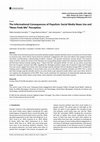
Politics and Governance, 2022
Prior studies have theorized a positive association between people's populist attitudes and an in... more Prior studies have theorized a positive association between people's populist attitudes and an increased use of social media to consume news, which will be mainly driven by individuals' engagement with news that reflects their people-centered, anti-elitist, and Manichean understanding of politics. However, such general connection remains elusive. This research seeks to further clarify this strand of the literature by incorporating people's belief that important political information will find them without actively seeking news-"News Finds Me" perception (NFM). For that, we use online survey data from two European countries that differ regarding the ideological political supply side of populism (Italy and Portugal). The main results suggest that citizens who hold stronger populist attitudes will also develop stronger NFM. Furthermore, findings reveal a mediating effect of social media news use on the effects of populist attitudes over NFM. That is, those who hold stronger populist attitudes tend to use social media to get exposed to public affairs news more often, which in turn explains the development of the NFM. These results emphasize the importance of systematically exploring citizens populists' attitudes within today's social media, social networks, and complex information systems.

Digital Journalism, 2021
Recent changes in the media environment make it easier than ever for people to actively shape the... more Recent changes in the media environment make it easier than ever for people to actively shape their news repertoires according to their habits, needs, and preferences. As convenient as these practices seem, they may favor the development of misperceptions such as "news finds me" perception (NFM) and make it easier for some people to disconnect from news and political content. Building on the conceptualization of news avoidance as a general disposition and its consequential behaviors, this study jointly examines key individual-level predispositions that may motivate intentional news avoidance. Based on a two-wave survey collected in the United States, our results largely corroborate previous work showing the association of political interest, news overload, and trust in professional news with news avoidance, and stress the importance of including the NFM in the theoretical and empirical modelling of news avoidance. Our analyses also suggest that the linkages between these individual-level antecedents and news avoidance are contingent upon the design and robustness of the empirical tests, with NFM yielding the most consistent association across models.

New Media & Society, 2021
Prior scholarship has consistently shown that informed citizens tend to better understand governm... more Prior scholarship has consistently shown that informed citizens tend to better understand government actions, expectations, and priorities, potentially mitigating radicalism such as partaking in illegal protest. However, the role of social media may prove this relationship to be challenging, with an increasingly pervasive use of applications such as WhatsApp for information and mobilization. Findings from a two-wave US panel survey data show that WhatsApp news is negatively associated to political knowledge and positively associated to illegal protest. Less politically knowledgeable citizens also tend to engage in illegal protest more frequently. Results also suggest an influential role of political knowledge in mediating the effects of WhatsApp news over illegal protests. Those who consume more news on WhatsApp tend to know less about politics which, in turn, positively relates to unlawful political protest activities. This study suggests that WhatsApp affordances provide fertile paths to nurture illegal political protest participation.
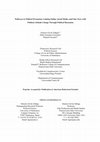
American Behavioral Scientist, 2021
There is a vast research tradition examining the antecedents that lead people to be politically p... more There is a vast research tradition examining the antecedents that lead people to be politically persuaded. However, political opinion and attitude change in social media has received comparatively scarce attention. This study seeks to shed light on this strand of the literature by theoretically advancing and empirically testing a structural equation model linking online social media, and fake news exposure, with political discussion and political persuasion in social media. Drawing on autoregressive causal tests from two waves of US survey panel data collected in 2019 and 2020, our results indicate that online, social media fake news, and political discussion are all positive predictors of individual political attitude change. Furthermore, structural equation tests reveal that online and social media news lead individuals to be exposed to fake news, which, in turn, predict higher levels of political discussion, ultimately facilitating political persuasion in the social media realm. Limitations and further suggestions for future research are also included in the study.
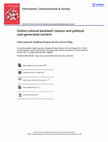
Information, Communication & Society, 2021
Prior research highlights substantial beneficial effects of political user-generated content (UGC... more Prior research highlights substantial beneficial effects of political user-generated content (UGC) in society, such as diversifying political viewpoints, mobilizing the electorate, and fostering citizens' civic engagement. However, important user asymmetries exist when creating political content. Gender, age, media uses, and skills gaps have been identified as key variables predicting UGC. This study addressed the political UGC gender gap from a political perspective. We build on previous theory about feminist media studies, political polarization, and cultural backlash theory to disentangle whether hostile sexism predicts UGC creation. Drawing on online survey data from four well-established democracies, we find that those individuals holding hostile sexist views are more likely to generate political content online. Further implications for democracy and the role of women in the digital sphere are discussed.
Social Media + Society, 2021
Using data from a two-wave panel survey among 18 countries worldwide, this study investigates the... more Using data from a two-wave panel survey among 18 countries worldwide, this study investigates the individual-and countrylevel antecedents of the "News Finds Me" perception (NFM). Results show that older, more educated, and individuals belonging to the ethnic majority are less prone to develop the NFM. However, social media (news) use, incidental news exposure, discussion frequency, and group affiliations lead to a higher NFM. In contrast, information elaboration as well as news use online were found to weaken the NFM. Testing various country-level factors, only gross domestic product was found to be negatively related to the NFM. The findings form a theoretical and empirical basis for future studies that aim at investigating news use in today's high-choice media environment.
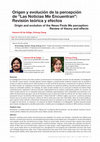
El Profesional de la Información, 2021
La investigación en torno a las redes sociales y la democracia se ha disparado. Durante casi dos ... more La investigación en torno a las redes sociales y la democracia se ha disparado. Durante casi dos décadas, la investigación ha ofrecido nuevas teorías, revisado algunas teorías antiguas y proporcionado evidencia empírica que ha ayudado a arrojar luz sobre los efectos de las redes sociales en la vida social de las personas y la democracia en general. Gracias a las redes sociales, los ciudadanos consumen noticias, expresan sus opiniones políticas, discuten asuntos políticos y par�ticipan en actividades políticas. Sin embargo, las redes sociales también son un canal para la difusión de noticias falsas y desinformación, exposición a discursos de odio, fragmentación de los medios y polarización política. En resumen, las redes sociales parecen ser un trampolín tanto para resultados esperanzadores como indeseables que fomentan y de�safían las democracias por igual. Uno de los fenómenos que se deriva de recibir las noticias por las redes sociales es la percepción de que “Las Noticias Me Encuentran” (“News Finds Me” o NFM en inglés), que ocurre cuando las personas sienten que ya no tienen que buscar noticias de forma activa para estar bien informadas sobre los asuntos públicos, pues esperan recibir noticias e información relevante por parte sus contactos en las redes sociales. Este artículo rastrea el origen de esta teoría, su evolución y el conjunto de efectos estudiados en la bibliografía. También presenta pautas para futuras investigaciones y desafíos potenciales a medida que la investigación centrada en NFM continúe creciendo.
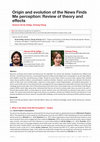
El Profesional de la Información, 2021
Research revolving social media and democracy has exploded. For almost two decades, scholarship h... more Research revolving social media and democracy has exploded. For almost two decades, scholarship has offered new theories, revisited some old ones, and provided empirical evidence that helped cast a strong light on social media effects over people's social life, and democracy at large. Thanks to social media, citizens consume news, express their political views, discuss political matters, and participate in political activities. However, social media also cultivates the dissemination of fake news and misinformation, exposure to hate speech, media fragmentation, and political polarization. In short, social media seems to simultaneously be a springboard for encouraging and undesirable outcomes that foster and challenge democracies alike. One of these phenomena that stems from social media news use is the News Finds Me perception (NFM), which takes place when individuals feel they do not have to actively seeks news any more to be well-informed about public affairs, as they expect to receive relevant news and information by relying on their peers in social media. This article traces back the origin of the theory, its evolution, and the set of effects found in the literature. It also presents guidelines for future research and potential challenges as the scholarship centering on NFM continues to grow.

Political Psychology, 2021
A generalized climate of distrust in political institutions is not functional to healthy democrac... more A generalized climate of distrust in political institutions is not functional to healthy democracies. With the advent of social media, recent scholarly efforts attempt to better understand people's conspiracy theory beliefs in inhibiting institutional trust. This study contributes to this literature by considering the direct antecedent effects of uncertainty avoidance and the moderating role of active social media use—SMU (i.e., interactional SMU, informational SMU, and political expressive SMU). The former is theorized to enable conspiracy theories to thrive, while the latter should cushion the negative effects of conspiracy beliefs on institutional trust. Relying on diverse survey data across different cultures from Europe, the Americas, and New Zealand (N = 11,958) and applying structural equation modeling, findings supported the hypothesized model. In high uncertainty‐avoidance societies, where less well‐known situations are perceived as uncomfortable or downright threatening, conspiracy beliefs proliferate and negatively impact institutional trust. Active SMU attenuates these effects. Via social media, citizens have the ability to strengthen social relationships (interactional SMU), keep themselves informed about the community (informational SMU), and engage in political self‐expression (political expressive SMU), which mitigate conspiracy‐belief negative effects on institutional trust. Future research implications and key limitations of the study are all discussed.

Social Science Quarterly, 2021
Objectives. Scholars are increasingly investigating the role of citizens’ personality in activati... more Objectives. Scholars are increasingly investigating the role of citizens’ personality in activating political behavior. We test whether extraversion is associated to collective political activities (i.e., activities that include social interaction) and individual ones (i.e., activities that do not include social interactions). Methods. We use originally collected survey data from five countries (Brazil, Korea, Russia, United States, United Kingdom). Results. We found that extraversion is positively and directly related to collective political activities in Brazil, Korea and Russia. Results show no direct relationship between individual forms of political activities and extraversion. However, political discussion fully mediates the relationship between extraversion and individual forms of political activities in all five countries. Conclusion. This study contributes to growing discussions on the role of personality traits in explaining political participation across countries, arguing that the relationship between extraversion and diverse forms of political participation are also context-driven and nourished by political discussion
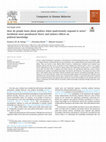
Computers in Human Behavior, 2021
Citizens’ political knowledge is regarded as a vital element for well-functioning democracies. Ac... more Citizens’ political knowledge is regarded as a vital element for well-functioning democracies. Accordingly, there is a vibrant literature assessing the link between individuals’ news seeking behavior and learning about public affairs. There are, however, more limited efforts devoted to clarifying how incidental news exposure may facilitate political learning. So far, inconclusive research findings have offered positive, null or even negative effects, emphasizing an urge for scholars to further explore this relationship. Drawing upon U.S. representative survey data, this study seeks to explicate and further advance the (paradoxical) paths that connect citizens’ incidental news exposure and political knowledge, both directly and indirectly. Our analysis first shows either null or mild negative direct associations between incidental news exposure and political knowledge. However, relying on a two serial mediators’ model, when citizens thoroughly engage with and cognitively elaborate on the information they unintentionally stumble upon, incidental news exposure is associated with positive mediated effects on political learning. This study provides evidence for a better understanding over the potential direct and indirect mechanisms that both facilitate and hinder political knowledge acquisition through inadvertent news consumption.
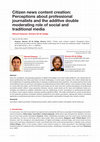
Profesional de la Información, 2021
Since the emergence and growing popularity of digital technologies and social media platforms, th... more Since the emergence and growing popularity of digital technologies and social media platforms, the relationship between professional and citizen journalism has been challenging. In recent years, however, this critical relationship has de-escalated due to a growing collaboration in shaping a complemental news repertoire. This study examines how social and traditional news use and users’ perceptions on professional journalism affect citizens’ news content creation. Based on survey data from Spain, we first find that social media use for news and users’ positive perceptions on professional journalism predict citizens’ news production behavior. Second, social media use for news and traditional media consumption are explored as additive moderators over the relationship of users’ perceptions on professional journalism on citizens’ news content creation, showing a positive significant effect. This study contributes to current conversations on the potential symbiotic association between professional and citizens journalism, arguing that citizens’ perceptual appraisals on professional journalism are key in fostering public’s participation through news content creation.
Online Information Review, 2021

The Social Science Journal, 2021
With the wider penetration of information and communication technologies (ICTs), digital divide s... more With the wider penetration of information and communication technologies (ICTs), digital divide scholars have turned attention from physical access to the difference in usage. Based on a national representative survey conducted in mainland China (N = l,004), this exploratory study contributes to the literature by explicating a new typology of social media usage divides predicted by demographic factors and personality traits (the Big Five) and by adding the context of an authoritarian country. The results show that even controlling for personality traits, age shows strong negative effects on most usages. Males and educated populations are also savvier in some of the usages. Interestingly, “reverse divides” were found in mainstream informational use, indicating that the older generations and the lower-income groups use social media for getting information from mainstream media relatively more frequently. This paper also reveals significant predicting and interaction effects of individuals’ personality traits on some usage divides.

Uploads
Articles by Homero Gil de Zúñiga
the influence of traditional sources of information online with
that of emergent sources (blogs) in predicting further political
discussion, campaigning and participation in both the online and
the offline domains. The results show that the use of traditional
sources online is related positively to different types of political
engagement, both online and offline. Most interestingly, the
article finds that blog use emerges as an equally important
predictor of political engagement in the online domain. Its analyses provide support for the contention that assert the democratic potential of the internet.